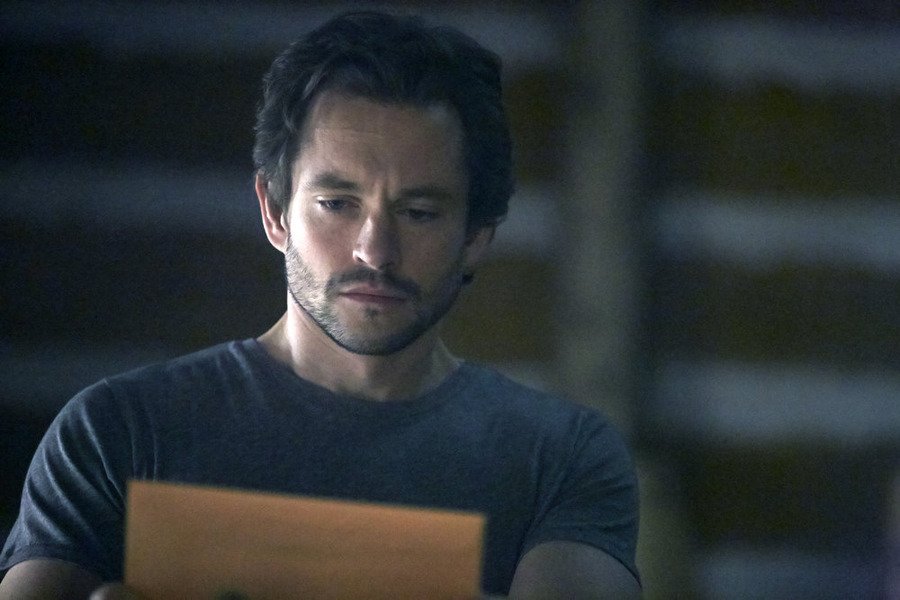Hannibal Review/Recap – “…And the Beast from the Sea”
Robert Tiemstra ’16 / Emertainment Monthly Staff Writer
“You shouldn’t put this guy in a mental hospital. You should kill him.”
Despite creating arguably one of the most iconic serial killers in fiction, there is a certain irony that pervades Thomas Harris’ literary work. The irony is that once he created Hannibal Lecter, he found himself almost completely unable to create antagonists with the same degree of brilliance. From Mason Verger’s cartoonishly over the top list of psychoses to the infamous Cannibal Nazi deserters, all of the villains in the Manhunter series are mechanically arranged mixes of childhood traumas and archetypes. Buffalo Bill is a serial killer who comes closer to escaping the formula, but he still pales dramatically compared to Lecter. The closest any of Harris’ villains come to having a story and motivation compelling enough to take the attention away from the man in the box is The Tooth Fairy (or Red Dragon, whichever moniker you prefer), played before by Tom Noonan, Ralph Fiennes, and now Richard Armitage.

Additionally, the scenes with Francis and Reba take Thomas Harris’ fiendish twist on traditional romantic subplots and go a step farther, having Dolarhyde host what may become known as the most disturbing movie night date ever. Reba, unable to see, imagines that Francis is looking over innocent photos of nocturnal animals, while Francis is actually looking at film he’s taken of future victims. The difference in perception is enough to send chills up the spine, because each of the two characters is essentially in a different scene than the other—Reba is in a love story, Francis is in Hannibal.
This episode also prominently features the first attack on Will Graham (Hugh Dancy) by the Great Red Dragon. This attack comes in the form of a late night home invasion, where the Tooth Fairy attempts to murder Molly Graham (Nina Arianda) and her son as they sleep. This will come as a surprise to fans of the novel, because the Graham home invasion does not come until the very end of the Red Dragon plot, allowing Will to save the day from the killer he thought had been caught. However, in this case, Will is nowhere near, so Molly has to outwit and elude The Great Red Tooth Fairy Dragon on her own. This makes for some superb suspense, as well as a reminder that now the stakes are personal. Will Graham isn’t just a hunter, he’s also a target.

Now, let’s talk about where all these threads connect: the titular omnipotent psychiatrist Dr.Hannibal Lecter (Mads Mikkelsen). Despite being confined in his cell for this half of the season, Dr. Lecter remains as mercurial as ever, freely contacting Dolarhyde and offering him extremely suspect therapy, which is visualized as taking place in Dr. Lecter’s old office. As Hannibal whispers in his ear while staring him in the eye (it makes sense in context), we realize that Dolarhyde is a twisted replacement for Will Graham in the mind of Dr. Lecter. Like Will, his sociopathic tendencies are similarly personified by an elemental beast, in this case a dragon rather than a stag.
The Hannibal we’ve seen in the last couple of episodes is profoundly different than the cultured psychiatrist from Seasons 1 and 2. As a prisoner, he is being smothered by an institution that controls everything about his quality of life, but he is somehow more willing to antagonize these people. His Machiavellian scheming and manipulation is masked by the honesty he is showing toward his own nature. This monster has no reason to conceal his true feelings, so perhaps it is not a coincidence that this is the first episode that shows us Dr. Lecter fitted with his iconic muzzle and dolly.
It is becoming harder and harder to review this series by its individual episodes—“…And the Beast from the Sea” opens by utilizing the scene of Dolarhyde eating The Great Red Dragon painting as its own cold open, creating the feeling that this is not a separate entry, but rather another piece of an unfolding sequence. The information in each new piece casts fresh light on sights and sounds glimpsed in previous episodes, presumably culminating in a full assembled puzzle by the end of the series. True Detective was notable earlier this summer for trying and failing to make this sort of continuous television narrative hold up a whole season, so perhaps Bryan Fuller’s decision to save the Red Dragon arc for the final stretch of this season (and ultimately this series) seems like a far more prudent one in retrospect.

“Would you have told me the truth?”
“In my own way, I always have.”
Episode Grade: A